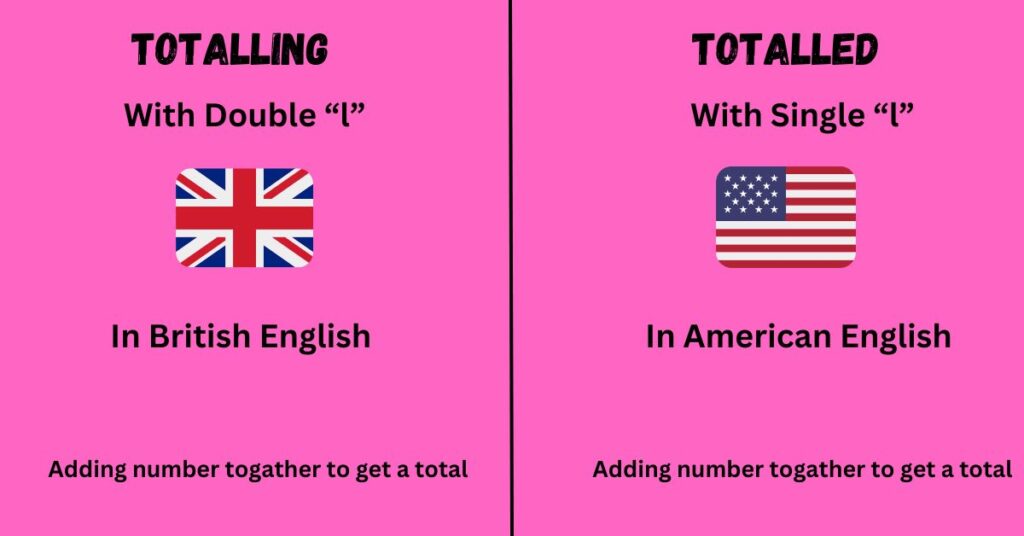Totaling or totalling can often confuse English speakers, especially those learning the language. These two terms, while they both refer to the same action of summing numbers, highlight the fascinating spelling differences between American English and British English.
Understanding these variations is crucial for effective communication, as it helps avoid common mistakes in word usage and ensures clarity in writing. Whether you’re calculating expenses, tallying scores, or simply trying to grasp the nuances of English spelling, knowing when to use “totaling” versus “totalling” can enhance your language skills.
This article will explore the differences, origins, and proper usage of these terms in everyday contexts.
Totalling or Totaling: What’s the Difference?
The primary difference between totaling and totalling lies in their regional spelling. Totaling is the preferred spelling in American English, while totalling is used in British English. Both words convey the same meaning: to sum up or calculate a total.
However, this distinction highlights how language variation can lead to different forms of the same word based on geographical location. In a world where English is spoken in many countries, these variations are essential to understand for effective communication.
Why is there Confusion Between Totalling and Totaling?
The confusion between totaling and totalling often stems from a misunderstanding of linguistic norms and regional preferences. Many people may not realize that English has various dialects, each with its own set of rules regarding spelling and usage.
For example, while Americans might use “totaling,” those in the UK will opt for “totalling.” This can lead to uncertainty when writing or speaking, especially for language learners who may not be familiar with these distinctions.
Additionally, some may mistakenly believe that one form is more correct than the other, when in fact both are valid within their respective contexts.
Origins of the Totaling
The verb “total” emerged in the early 1700s, with its earliest recorded use as a verb dating back to 1716 in the writings of bibliographer Myles Davies. Initially used as an adjective during the Middle English period (1150—1500), the word has evolved significantly.
The term “totaling” has its roots in American English, gaining popularity due to American grammar rules that favor simpler spellings, reflecting a trend toward efficiency and clarity in language usage. This simplification often involves dropping extra letters, as seen in “totaling.”
Origins of the Totalling
The word “totalling” serves as the present participle of the verb “total,” which originates from the Medieval Latin term tōtālis. This term combines the Latin word tōt(us), meaning “entire,” with the suffix -ālis.
The first recorded use of “total” in Middle English dates back to between 1350 and 1400. In British English, “totalling” retains the double “l,” aligning with similar words like “cancelling” and “travelling,” reflecting traditional spelling rules that emphasize historical forms of English.
Understanding these origins clarifies the distinctions between American and British spelling conventions.
Totaling: Definition and Usage
In terms of definition, totaling means calculating or summing up a number or amount. It is often used in contexts such as finance, mathematics, or any situation where one needs to arrive at a final figure.
For example, when you go shopping and add up your expenses at the register, you are totaling your purchases. You might say, “I am totaling my expenses for this month.” This sentence clearly illustrates how to use “totaling” correctly.
Synonyms for Totaling and Totalling

Here are 10 synonyms for totaling:
- Adding up
- Summing
- Tallying
- Calculating
- Computing
- Aggregating
- Counting
- Reckoning
- Assessing
- Enumerating
Each of these terms can be used interchangeably in various contexts. For example, you might say, “I am adding up my bills” or “I am calculating my savings.”
Totalling: Definition and Usage
Similarly, totalling carries the same definition as its American counterpart but is used primarily in British contexts. When someone refers to totalling an amount, they mean they are summing it up just like in American English.
An example sentence could be: “He is totalling his scores after the exam.” This shows that even though the spelling differs, the meaning remains consistent across dialects.
Side by Side Comparison
To better understand these differences visually, here’s a side-by-side comparison:
| Feature | Totaling (American) | Totalling (British) |
| Spelling | Single “l” | Double “l” |
| Regional Preference | American English | British English |
| Meaning | Same as totalling | Same as totaling |
| Common Usage | Preferred in USA | Preferred in UK |
This table illustrates how both terms function similarly yet differ based on regional spelling conventions.
Everyday Usage Examples
In daily life, totaling and totalling appear in various contexts. For instance, you might say, “I am totaling my expenses for the month,” when discussing finances.
Alternatively, in a British setting, someone might express, “She is totalling her scores after the game.” These examples illustrate how both terms function similarly while reflecting regional spelling preferences.
Totaling Example
Consider a scenario where you need to calculate your monthly budget after paying all your bills.
You might say: “After totaling my expenses for January, I realized I need to save more next month.” This example shows how totaling fits naturally into everyday conversation about finances.
Using Totaling in Sentences
Here are several sentences demonstrating proper usage of “totaling”:
- “She spent hours totaling her receipts from last year.”
- “The accountant is responsible for totaling all transactions at month-end.”
- “After totaling our scores from the game night, we found out who won.”
Totalling Example

Imagine someone reviewing their exam results in a British context: “After totalling his marks from all subjects, he was pleasantly surprised by his overall score.” This sentence illustrates how totalling functions within British English.
Read More Article: Usage or Useage: What’s the Difference?
Using Totalling in Sentences
Here are some sentences using “totalling”:
- “He spent time totalling his expenses before submitting his tax return.”
- “The teacher is totalling all students’ grades for the semester.”
- “She enjoys totalling her fitness achievements at the end of each week.”
Conclusion
Understanding the distinction between totaling or totalling is essential for effective communication in English. While both terms convey the same meaning of summing numbers, their usage varies based on regional spelling preferences. American versus British English.
By recognizing these differences, you can enhance your writing style and avoid common grammar mistakes. Whether you’re calculating expenses or tallying scores, knowing when to use “totaling” and “totalling” will improve your clarity and confidence in the English language.
Read More Article: Journeys or Journies: What’s the Difference?
FAQS: Totaling or Totalling
Which is correct: totalled and totaled?
“Totaled” is the correct spelling in American English, while “totalled” is preferred in British English.
How do you use totaling?
You use “totaling” to describe the act of summing or calculating a total, as in “I am totaling my expenses for the month.”
How do you spell totalling in Canada?
In Canada, both spellings are accepted, but “totaling” is more commonly used in American contexts, while “totalling” aligns with British English.
Why is it called totaling a car?
The term “totaling a car” refers to assessing that the cost of repairs exceeds the vehicle’s value, resulting in it being declared a total loss.
Is it totaling or totalling us?
In the U.S., the correct spelling is “totaling,” while “totalling” is used in British English and other Commonwealth countries.

